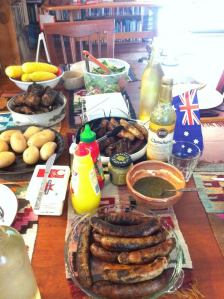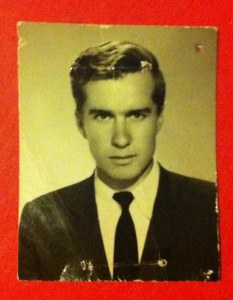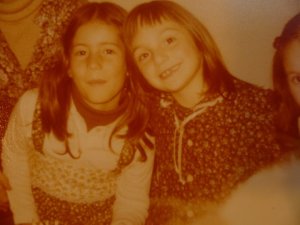On January 26 Australians awaken to exclamations of happiness and expectations for happiness. This is soon followed by remembrance of the effect of this devastating historical date on the indigenous peoples of this land prior to British settlement. Whilst in some sectors that feeling will linger, in others it will be washed aside with a staunch defence that there is no place for guilt for actions taken by people 200 years ago.
This is Australia’s National Day. One during which BBQs will fire up, snags (sausages) will be had, balls (cricket or afl) will be kicked around, and sand from any of our many gorgeous beaches will find it’s way to our skin.
The flag will appear in the most random places and be worn by some on garments made in China, but we don’t care. Australian’s are not often patriotic, but when they are, a certain amusing element of kitsch finds its way there.
Our Australia Day lunch
Other countries may celebrate their day with military marches, or dress in typical costumes, sing traditional songs, but this young country revels in none of that pomp. On Jan 26, Aussies just want to have fun in the sun and as radiant as the sunshine feels on our skin, is our belief that we are the luckiest, most blessed country in the world. We are happy in general to be here, despite our issues or differences.
Our happiness is born from many reasons, not all relate to beer and surf. Mainly that as a multicultural society, we are very aware of the strife most of our countries of origin are in, were in, are about to be in. We are grateful to be far away from these problems. We may have our own, homegrown ones, but we no longer bear the burden of the old ones. Yet this is a catch 22 as you can never fully let go of home and are unsure of the new one you’re building. Non Aboriginal Australia is a country largely made up by immigrants. Some have been here 200 years, others less, but we are the product of generations of migrants.
The migrant nature of our country is something we tend to forget, unless we’re referring to the most recent influx. And so, as the day wears on, the inevitable question pops up. Who is an Australian, what defines us, what is a real one? It can become equally as inflammatory as it can be received in absolute apathy.
I won’t attempt to answer that question, but I will attempt to deconstruct what it is for me.
I have lived in Australia for 36 years, and at different stages in my life, my identity as a “new Australian” has meant different things. Rather than as an identity, I think of being Australian , as a relationship, one that is constantly being tested and negotiated, which at time has me mesmerised and at others feeling like I should pack my bags and walk out the door. It’s not easy and that’s the truth. Life as an immigrant to any country is complex, even to one as paradise like as this.
My family arrived to Australia when I was 3 years old from Bolivia. We were selected as eligible migrants by an Australian government migrant recruiter in Bolivia. Yes they even went that far! My father was told we had to pay our airfare but that would be refunded upon arrival and we could have temporary accommodation at a hostel which would offer services and facilities to help us assimilate.
My father thought the country we were going to must be great if they were so welcoming, helpful and supportive, even though his English was limited to a few phrases. He was a lawyer, my mother an orthodontist, willing to leave family and a comfortable upper middle class life. But one which had become intolerable for political reasons I’d rather not discuss. Their optimism to face the unknown was remarkable. Yes, they decided this would be a big adventure. And I was happy to be a part of it.
Whether I’m an “Aussie” or not, I really don’t know. To some I may not be, and this includes family back home and “true blue Aussies”. To others I am, and again this also includes family back home. I’ll leave it to others to decide, as I’ve long since stopped trying to, and don’t feel a need to.
However I can think of 3 uniquely Australian experiences that formed who I am today, from a very early age which may or may not have happened elsewhere.
1. I was very quick to learn English in the first few months at Springvale’s Enterprise Hostel’s creche. Soon enough, and unbeknownst to me, I became my dad’s interpreter and he would have me ask questions for him when dealing with other adults. I had no idea he couldn’t speak English and I felt very important performing this task. Even when my father did learn English, I would offer to be the intermediary between him and anyone else. I learnt the value of communication through this role. Communication was a very conscious concept for me, and a certain level of diplomacy also was born from the to & fro’ing as I knew the person I would give the message to may not always agree with that, so I’d have to find the right words.
Lesson 1: Communication is essential to cooperation and survival. Words are powerful but above all else, the tone with which one delivers them, adapting your message to the one you’ll deliver it to, and self confidence in doing so, are essential. Understanding comes from listening well to all sides.

My passport picture at age 3, as we prepare to embark on our adventure as migrants to the land of kangaroos, political stability and freedom!
My wonderful father, Juan Carlos, a few years before he would lead his young family on the first of many adventures globally always with a positive spirit encouraging us to learn as much from the new country as we could.
2. Once I started primary school, the blonde blue eyed children seemed to want to play only with other blonde blue eyed children. This meant that the brown haired children with dark eyes had to form a clique of their own. Thanks to this I learnt how to eat Greek food and that some Italian words sounded very similar to Spanish. I also learnt that people from Egypt didn’t look like those in the pictures from tombs in the pyramids. My best friends were all second generation Australians, but in that playground, I learnt that we were not “real Australians” . So I decided to never speak Spanish in public, nor to eat “ethnic” food if any blonde people were around.
The exception to this, were my neighbours. Aussie kids with either blue eyes, blonde hair, but who liked me for me and didn’t care if my hair was dark. These were the people that I’d invite to my birthday parties and who I didn’t have to modify, water down or hide my ethnicity to.
The sad thing was that I was starting to forget many things about life in Bolivia, so I no longer felt Bolivian, but I had been taught that I wasn’t really Australian either. In that moment nationality stopped being relevant for me. I was free to simply be myself.
Years later I would re-experience versions of this, again in school through more narrow minded children and teenagers. And also through older people who upon hearing me speak Spanish with my family when out in public, would tell us to f*g learn English. I’d inform them that English was one of four languages I spoke and then taught them an expletive in Spanish, without necessarily translating it for them.
Lesson 2: Social exclusion for racial reasons is soul crushing. Social inclusion regardless of race is soul lifting. We are not our racial, social, cultural identity, those are merely situations we are born into. We are souls merely wanting to connect and share happiness. It’s that simple.
With one of my Greek friends at a birthday party in our home on my 7th birthday.
3. In the spirit of adventure which my family started their lives to this country, they continued it, and always with great vigour, passion and admiration for our new home. We travelled by land and air to almost every corner of this big island, New South Wales, Queensland up to Noosa, Adelaide, Central Australia, Darwin, and all over Victoria.
I know the colour of the earth and the changing shades of leaves as you exit one region and enter another. I know the stars as they shine in the middle of the desert at night. I know the smell of the earth as it lifts up from the ground whilst aboriginals stomp on it, dancing in a corroboree around a fire, and I know how to stomp on that earth with them too.I know what water lilies look like as you swim through them and see the shining eyes and smile of Aboriginal children who include you in their play, as I was able to experience as a 6 year old…
I know what perfect sand on endless beaches devoid of any human beings look like and the embrace of waves in clear blue waters. I know what it feels like to travel like a gypsy, that glorious feeling of freedom.. but above all, I know what it’s like to do all of this in safety on roads that are well taken care of. And I know what it’s like to be so far away from any trace of life that you genuinely fear for what might happen if your car malfunctions in any way.. yet that’s not reason enough to stop.
We drove through towns which share one thing in common, they respect the traveller for the simple fact that s/he is out there exploring, braving and taking in nature. The overwhelming beauty of Australia’s mountains, beaches, deserts, rivers, lakes and forests is humbling and once you’ve experienced it, it’s hard not respect those who seek to experience it.
In country towns far and wide, my family have always been received with this kindness, helpfulness and solidarity.
Whether it’s the simplicity of the land, it’s magnificence or harshness, non city dwellers are on one level united by it, and this definitely includes travellers who seek happiness through the power of nature’s presence.
Lesson 3: Travel and travel as often as you can afford to. (Club Med doesn’t count) Travel is the one thing that can break down your own barriers and that of others. Excessive routine of the familiar tends to entrench narrow mindedness.
If you can’t travel, welcome the traveller! Know that the exchange will be as re energising for them as it will be for you.
People thrive through experiencing diversity and stagnate with the false sense of security unchanging sameness gives them. Movement brings growth and growth should move you, physically and emotionally, not just change the scenery whilst still recreating old patterns.
The very first day we ever set foot on a beach, 1975 Absolute magic!
So whilst so many debates come up on this day, on everything from the relevance of the flag to whatever faux pas our Prime Minister has committed that is unAustralian and everything in between, I no longer engage with many of these polemics regarding nationhood or identity.
I believe it’s too early to define what is Australian/unAustralian , that will become evident over time as we mature in the process. Let’s put that worry aside for a short while. But we can define what makes us happy. Let’s focus on that.
In this country I’ve learnt much of value, sometimes more joyfully than at other times.
I realise that I can be Happy when
1. I have the freedom to communicate
2. I can be curious and explore,
3. I form positive connections which embrace inclusion over exclusion,
These, are the Australian lessons I cherish most.
Being an Australian means different things to different people, for me, it has come down to those three. Regardless of where ever in the world I am, those lessons, or values I take with me always. Those values are the ones that bring me happiness and that when shared bring others happiness too.
Thank you Australia. Have a Happy Day.





I wish I had said that!
LikeLike
thank you 🙂
LikeLike